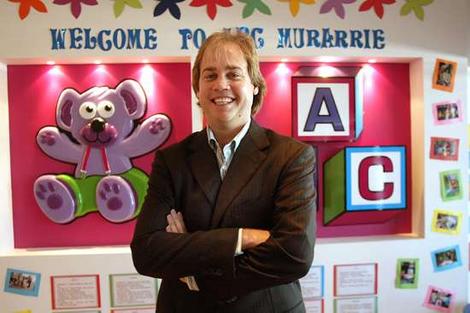Corporate pre-school care centres are increasingly privately provided in Australia, with 70 percent of the long-day care centre market run for profit. Long-day child care centres can be very profitable because of government subsidies and high demand. The market approach to pre-school care has seen prices soar (up 12 percent in 2005 – up to $100 per day per child) because of high demand. This means many women are forced to stay home because they cannot afford child-care.
 Despite the high prices paid by parents, Lynne Wannan, the convener of the National Association of Community-Based Children’s Services, notes: “[s]tandards have been lowered, poorly paid and inexperienced staff employed and dubious practices crept in as larger providers built bigger centres and strove to get economies of scale.” The larger child-care companies have also “used predatory pricing to drive smaller, community-based services and even smaller private operators out of business” which has reduced supply and allowed them to subsequently put the prices up.
Despite the high prices paid by parents, Lynne Wannan, the convener of the National Association of Community-Based Children’s Services, notes: “[s]tandards have been lowered, poorly paid and inexperienced staff employed and dubious practices crept in as larger providers built bigger centres and strove to get economies of scale.” The larger child-care companies have also “used predatory pricing to drive smaller, community-based services and even smaller private operators out of business” which has reduced supply and allowed them to subsequently put the prices up.
A 2005 survey of child long-day care centre staff by the Australia Institute found that corporate chain child care centres offered the lowest quality of child care, compared with community-based centres, which offered the highest quality and independent private centres which fell between the two. Aspects of quality covered in the survey included staff relationships with children, staff-to-child ratios, quality of equipment and food, and “whether the centre’s program accommodates children’s individual needs and interests”. The report claimed:
The business orientation focuses on ‘efficiency and production of measurable outputs’ and ‘considers parents to be the purchasers who are concerned with cost and affordability’. The humanist orientation, on the other hand, sees the ‘care of children as personalised’ rather than a product that can be standardised for all children.
|
Reference: Deborah Brennan and Mab Oloman, 'Child Care in Australia: A market failure and spectacular public policy disaster', Our Schools, Our Selves, Spring 2009; Matt Wade, ‘Shouldering the Burden’, Sydney Morning Herald, 27-28 May, 2006, p. 34.
ABC Learning Centres dominated the Australian market until it went into bankruptcy in 2008. At that time it had more than 1000 centres in Australia and NZ catering for 120,000 children. It had 23 percent of the entire Australian market and 36 percent of the commercial market. Reference: Ben Hills, 'Cradle Snatcher', Sydney Morning Herald, 11 March 2006.
The child care industry was very lucrative for founder Ed Groves (pictured) who was “ranked No. 2 on BRW’s list of the richest Australians aged under 40” in 2005, “with an estimated wealth of $272 million.” |
 Photo of Eddy Groves by Robert Rough |
In 2006 ABC Learning Centres was worth $2.4 billion. It received 44 percent of its revenue – $128 million of its $292 million revenue in 2005 – from the Australian government, mainly through tax rebates to parents. It made a half yearly profit of $38 million in 2005. Nevertheless it was accused of underpaying staff, forcing childcare staff to clean toilets, and keeping staff quiet with confidentiality agreements and the threat of law suits for defamation.
ABC was also the largest publicly traded childcare provider in the world and was aiming to be the largest provider in the US. In 2006 it purchased Learning Care Group which had 460 centres and La Petite Academy which had 650 centres. It has also purchased Busy Bees, the fifth-largest UK childcare company and merged with Leapfrog. ABC also sought to establish for-profit schools in Australia.
In the year of its bankruptcy, ABC received $300 million in government subsidies and then the government spent tens of millions of dollars trying to rescue ABC and keep child care centres open so families depending on the centres would not be abandoned abruptly.
Private companies provide after-school child care in Australia, the largest being Camp Australia Pty Ltd, which has sponsorship deals with other commercial companies such as Nike and Uncle Toby. It provides out of hours services at 140 schools in Victoria and is increasing its services in NSW with the help of Federal Government subsidies.
The problem with these commercial operations is that they are relatively unregulated, don’t allow parents to have much say in how they are run, expose children to corporate marketing and prioritise profit over children’s needs. They also tend to be sited in affluent areas leading to oversupply in some neighbourhoods and long waiting lists in other areas.
If you have any examples or updates you would like to contribute please email them to me and I will add them here. Please give references for where you sourced the information.